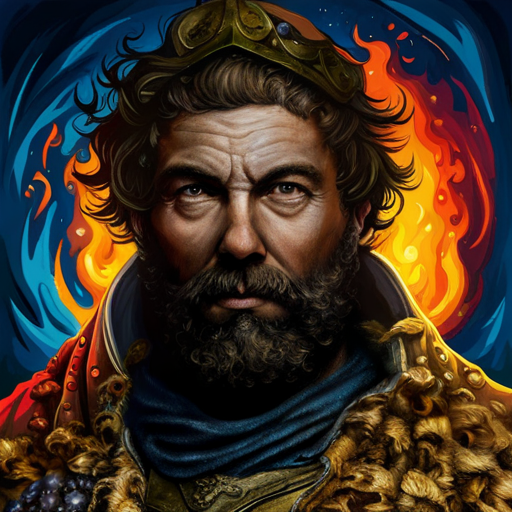Autobiography of Hannibal Barca
Childhood
Born in 247 BC, I am Hannibal Barca, son of Hamilcar Barca, the mighty Carthaginian general. My birthplace, Carthage, was a powerful city-state on the north coast of Africa, known for its wealth, naval power, and a prosperous society founded by Phoenician settlers. But my childhood was not about play; it was filled with lessons of war, statecraft, and a burning vengeance against Rome, our sworn enemy.
My father instilled in me an eternal enmity for Rome. I remember his words as if they were uttered yesterday. “Promise me,” he had said, placing my hand upon the sacrificial altar, “that so long as you shall live, you will bear no good will towards Rome.” I had barely completed nine summers, yet the words resonated within my young soul, forging the path that I would walk in years to come.
Under My Father’s Wing
As I grew older, my father took me to Spain, the new frontier for Carthage after our loss in the First Punic War. It was here, under his tutelage, I first tasted the life of a soldier, understanding the gravity of the pledge I had given him. I watched him win battles, conquering lands, and bringing prosperity to Carthage, but above all, I saw the leadership and determination that made him a great general. I yearned to be like him, a beacon of hope for our people, and it was his death that thrust me into the maelstrom of leadership.
Leading the Carthaginian Army
When I was 26, I was elected commander of the Carthaginian Army after my brother-in-law’s death. My father’s teachings, the love for my people, and the promise I made him – it all led me to this point. I was ready to face our adversaries, and I had a plan. A daring plan that had not been attempted before, a plan to attack Rome, but not through the sea. Instead, we would cross the treacherous Alps and take them by surprise.
Crossing the Alps
The journey across the Alps in 218 BC remains one of the most monumental feats of military strategy. I remember the biting cold, the towering peaks, and the constant threat of avalanches. But amidst the peril, there was an unwavering determination in the eyes of my men. We pushed on, losing many men and elephants to the cruel weather and hostile mountain tribes. But when we descended onto the Italian plains, it was not a beaten and battered army; it was an invincible force ready to take on the might of Rome.
Battles and Victories
The battles of Trebia, Lake Trasimene, and Cannae – my greatest victories – are tales that echo through the annals of history. With superior strategy, indomitable spirit, and the fervor of my men, we crushed Roman legions, making Rome tremble with fear. Cannae was my masterpiece, where I encircled and slaughtered an army double the size of my own.
Yet, even in victory, there was an understanding of the enormity of the task that lay ahead. Rome was a formidable adversary, one that would not yield easily.
The Turn of Tide
As years passed, the tide of the war began to turn. Rome, learning from its defeats, started adopting a strategy of attrition, avoiding direct engagement and focusing on cutting off my supplies and reinforcements. Slowly, it began to wear my forces down. It was a game of patience, and I found myself lacking the necessary resources to break them.
My brother, Hasdrubal, was supposed to join me with reinforcements. But the news of his defeat and death in the Battle of the Metaurus in 207 BC was a bitter blow. It marked the beginning of the end.
Return to Carthage
In 203 BC, I was recalled to defend Carthage against a Roman attack. The Second Punic War came full circle as I faced Scipio Africanus, the Roman general, at the Battle of Zama. Despite my best efforts, we were defeated. It was the end of the long and exhausting war, a war that had shaped me, a war that had come to define me.
The Aftermath and End
The loss at Zama was not just a personal defeat; it marked the end of Carthage’s status as a world power. I returned to politics, brought about many reforms, and even served as a chief magistrate. But my heart ached for the glory that was lost, for the dream that was shattered.
I lived my final years in exile, pursued by my relentless enemies. They feared me even when I was far away from my homeland, even when I was old and weary. And perhaps they were right to fear, for had I had another chance, I would have risen again. But fate had other plans, and to escape capture, I chose to die by my own hand in 183 BC.
I was Hannibal Barca, son of Carthage, the scourge of Rome. I was the man who dared to cross the Alps, who dared to challenge the might of Rome. I was a warrior, a leader, a reformer. I may have lost the war, but my spirit, my resilience, will echo through the ages.
Hannibal Barca Books and Audio Books on Amazon.
Show more +